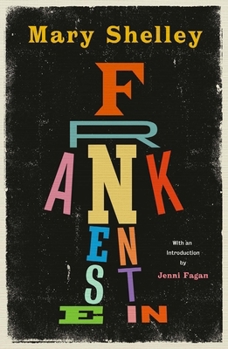Frankenstein: New Edition of Mary Shelley's Gothic Masterpiece
Tells the tragic story of ambition, creation, and the consequences of playing God in a cautionary tale.
One of the best-known works of English literature, Frankenstein gave rise to the science-fiction and horror genres and has enthralled generations of readers since its publication in 1818.
The book follows the story of Victor Frankenstein and his monster: the result of his desire to create life. But his botched experiment is so grotesque that the doctor immediately regrets what he has done and abandons the monster, leaving him to fend for himself. The creature finds and confronts his maker pleading for a companion - his human right to happiness. Fearing what this may lead to, Victor refuses, causing the monster to vow to ruin any happiness in Victor's life.
A tragedy and a cautionary tale about the pitfalls of ambition and creation, Mary Shelley's masterpiece is more relevant now than ever.
One of the best-known works of English literature, Frankenstein gave rise to the science-fiction and horror genres and has enthralled generations of readers since its publication in 1818.
The book follows the story of Victor Frankenstein and his monster: the result of his desire to create life. But his botched experiment is so grotesque that the doctor immediately regrets what he has done and abandons the monster, leaving him to fend for himself. The creature finds and confronts his maker pleading for a companion - his human right to happiness. Fearing what this may lead to, Victor refuses, causing the monster to vow to ruin any happiness in Victor's life.
A tragedy and a cautionary tale about the pitfalls of ambition and creation, Mary Shelley's masterpiece is more relevant now than ever.
Format:Mass Market Paperback
Language:English
ISBN:1846976952
ISBN13:9781846976957
Release Date:March 2025
Publisher:Polygon
Length:240 Pages
Weight:0.45 lbs.
Dimensions:0.8" x 5.0" x 7.7"
Customer Reviews
1 rating
"Cursed, cursed, creator." - The monster
Published by bernie4444 , 6 months ago
Victor grew up reading the works of Paracelsus, Agrippa, and Albertus Magnus, the alchemists of the time. Toss in a little natural philosophy (sciences) and you have the making of a monster. Or at least a being that, after being spurned for looking ugly, becomes ugly. So, for revenge, the creature decides that unless Victor makes another (female this time) creature, Victor will also suffer the loss of friends and relatives. What is Victor to do? Bow to the wishes and needs of his creation? Or challenge it to “the death”? What would you do?
Although the concept of the monster is good, and the conflicts of the story are well thought out, Shelly suffers from the writing style of the time. Many people do not finish the book as the language is stilted and verbose, for example, when was the last time you said, "Little did I then expect the calamity that was in a few moments to overwhelm me and extinguish in horror and despair all fear of ignominy of death."
Much of the book seems like a travel log filler. More time is spent describing the surroundings of Europe than the reason for traveling or just traveling. Many writers use traveling to reflect time passing or the character growing in stature or knowledge. In this story, they just travel a lot.
This book is worth plodding through for moviegoers. The record needs to be set straight. The first shock is that the creator is named Victor Frankenstein; the creature is just a "monster", not Frankenstein. It is Victor who is backward, which adds to his doing the impossible by not knowing any better. The monster is well-read in "Sorrows of a Young Werther," "Paradise Lost," and Plutarch's "Lives." The debate (mixed with a few murders) rages on as to whether the monster was doing evil because of his nature or because he was spurned.






